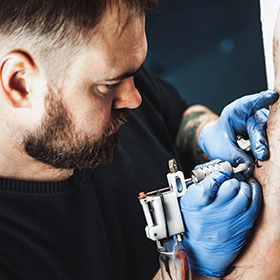Numbing cream can help ease the pain of getting a tattoo. But, is it bad for tattoos?
Many people wonder if numbing cream affects tattoo quality or healing. While it can reduce discomfort, some worry about its impact on the tattoo process. In this blog, we’ll explore the pros and cons of using numbing cream. You’ll learn about its effects on your skin and how it might influence your tattoo experience.
By the end, you’ll have a better understanding to make an informed choice. So, let’s dive into the world of numbing creams and tattoos.
Introduction To Numbing Cream
Numbing cream helps reduce pain during a tattoo. It can make the process more comfortable. Artists and clients often use it to ease anxiety. Some people feel less pain, so they can sit longer. Others may feel a slight tingling. The cream can be applied to the skin before the tattoo starts. This ensures the area is numb.
Most numbing creams have lidocaine. This is the main ingredient. It blocks nerve signals. Some creams also have benzocaine or tetracaine. These help with numbing too. Epinephrine is sometimes added to reduce swelling. Always check the label for ingredients. This helps avoid allergies. Ingredients work together to make the skin less sensitive.
How Numbing Cream Works
Numbing cream temporarily blocks nerve signals in the skin. It can reduce pain during tattooing but may affect ink absorption. Always consult a professional.
Mechanism Of Action
Numbing cream contains local anesthetics like lidocaine. These anesthetics block nerve signals in the skin. When applied, the skin becomes less sensitive. This helps in reducing pain during tattooing.
Duration Of Effect
The effect of numbing cream lasts for 1 to 2 hours. This depends on the type and amount of cream used. Reapplication may be needed for longer sessions. Always follow the instructions on the cream.
Pros Of Using Numbing Cream For Tattoos
Numbing cream helps reduce pain during a tattoo. It makes the process more bearable. Many people feel less anxious with it. This makes the tattoo experience better. You can focus on the art, not the pain. Some people might not even feel any discomfort at all.
Numbing cream adds to your comfort during tattoo sessions. Long sessions become easier to handle. You can sit still longer. This helps the tattoo artist do a better job. Comfort can lead to better results. It allows you to enjoy the process more.
Cons Of Using Numbing Cream For Tattoos
Some people may get rashes or redness from numbing cream. It can cause itching and swelling too. Sensitive skin might have a burning feeling. Always test a small area first. Allergic reactions might need a doctor’s help. It’s best to know your skin type.
Numbing cream can change skin texture. This makes it hard for the artist to work. The cream might also affect ink. Colors could be less vibrant. Tattoos might fade faster. The cream can also cause uneven lines. Artists often prefer working on natural skin.
Expert Opinions On Numbing Cream
Experts suggest numbing cream for tattoos can sometimes affect ink absorption. Some artists believe it might alter tattoo quality. Always consult your tattoo artist before using numbing products.
Tattoo Artists’ Perspective
Many tattoo artists have mixed feelings about numbing cream. Some believe it can help clients, especially with large tattoos. Others worry it might affect the tattoo process. Numbing cream can make the skin more difficult to work with. The tattoo might not look as good. Some artists think it can cause more pain when it wears off. They prefer clients to feel the tattoo. This helps them know when to take breaks.
Dermatologists’ View
Dermatologists often say numbing cream is safe for most people. They think it can reduce pain and make the experience better. But they also note some risks. Allergic reactions can happen. The cream might not work for everyone. It is important to follow instructions and test a small area first. This helps avoid problems. Dermatologists suggest talking to both the artist and a doctor before using numbing cream.
Alternatives To Numbing Cream
Some people use deep breathing to handle pain. Others find meditation helpful. Listening to music can also distract from pain. Another option is hydration. Drinking lots of water can help. Healthy eating keeps the body strong. Exercise can boost pain tolerance. Sleep is important too. Good rest helps the body heal.
Topical anesthetics are creams or gels. They numb the skin. Some people prefer lidocaine. Others use benzocaine. These products can reduce pain. They are easy to apply. Just spread on the skin. Wait for it to work. Follow the instructions. Be careful with sensitive skin. Test a small area first.
Safety Tips For Using Numbing Cream
Clean the skin first. Apply a thin layer of cream. Use gloves to avoid skin contact. Wait for the cream to absorb. This takes about 30 minutes. Do not use too much. It can be harmful. Follow the instructions on the product.
Before using, do a patch test. Apply a small amount on your wrist. Wait 24 hours. Check for any reaction. Redness or itching means stop use. Testing helps avoid bad reactions. Always check before using on large areas.
Conclusion
Numbing cream can help reduce tattoo pain. Some people might experience side effects. Always consult a professional before use. Each person’s skin reacts differently. Weigh the pros and cons carefully. Comfort matters during a tattoo session. Make an informed choice.
Stay safe and enjoy your new tattoo.

